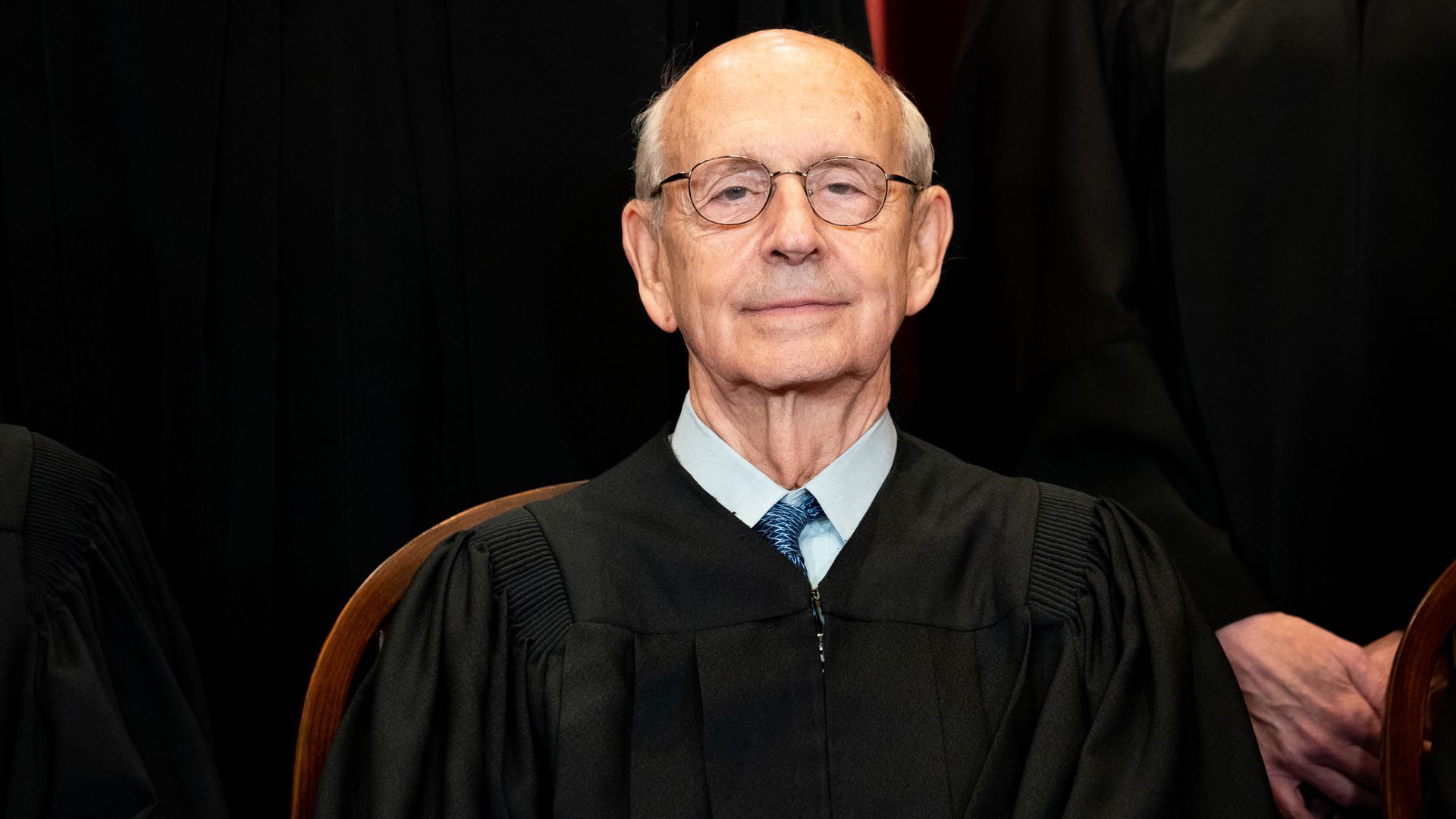| |
| |
| |
| Presented By AT&T |
| |
| Axios AM |
| By Mike Allen ·Aug 03, 2021 |
| Good Tuesday morning! Smart Brevity™ count: 1,282 words ... 5 minutes. Edited by Zachary Basu. ⚡ Spoiler protection: Get the latest on how Simone Biles did. |
| |
| |
| 1 big thing — Scoop: Biden stiffs left on Breyer |
 |
|
| Justice Breyer at the Supreme Court in April. Photo: Erin Schaff via Getty Images |
| |
| President Biden and his top aides are rebuffing activists who want the White House to pressure Supreme Court Justice Stephen Breyer to retire, sources with direct knowledge of the situation tell Jonathan Swan. Behind the scenes: Both Biden and White House chief of staff Ron Klain believe applying such pressure — publicly or even privately — would politicize and damage the institution of the Supreme Court. - They're also afraid it could backfire.
Why it matters: Anxiety is rising on the left about Breyer, who turns 83 on Aug. 15 and has shown no inclination to vacate his seat for a younger liberal justice. - Progressives have PTSD about Ruth Bader Ginsburg's fateful decision to hang on through the Obama era. She died during Donald Trump's presidency, giving Republicans the power to choose her replacement.
Biden would be perfectly happy if Breyer chooses to step down soon. - But the president and Klain disagree strongly with progressive activists who are urging a presidential pressure campaign on Breyer to retire, according to sources with direct knowledge.
- They also think it's tactically stupid. They believe that pressuring Breyer could cause the justice to stay in his job longer to prove he's unmoved by political interference.
- Breyer appears to be relishing his new role as the court's most senior liberal justice. It's far from clear that he would give this up because of presidential pressure.
A White House spokesman, Andrew Bates, said: "The president's view is that any considerations about potential retirements are solely and entirely up to justices themselves." State of play: Most Democrats in Congress — even staunch progressive senators like Elizabeth Warren — have held back from publicly calling for Breyer to retire. - Public pressure on Breyer has come mainly from advocacy groups. The most aggressive has been Demand Justice, led by Brian Fallon, a former spokesman for Obama's Attorney General Eric Holder.
Demand Justice first called for Breyer to step down in January. The group has run an online petition and digital ads, and hired a billboard truck to circle the Supreme Court. - Fallon told Axios: "For Democrats to sit on their hands and be content to potentially watch a slow-motion replay of the RBG situation play out just goes to show the folly of our party's passive approach to the courts over the years."
Share this story. |
    |
| |
| |
| 2. COVID hospitalizations surge to last summer's level |
 Data: Our World in Data. Chart: Will Chase/Axios Coronavirus hospitalizations are surging again, threatening to overburden some local health care systems just as badly as the waves that hit last spring and summer, Axios' Caitlin Owens reports. - More than 40,000 patients are currently hospitalized for COVID-19 infections.
- Florida is setting new COVID-19 hospitalization records, forcing the state's largest hospital systems to limit visitors, expand coronavirus units and prepare for staffing shortages, ABC News reports.
Share this graphic. |
    |
| |
| |
| 3. Axios-Ipsos poll: Blame goes to unvaccinated, foreigners, Trump |
 Data: Axios/Ipsos Coronavirus Index. (July 30-Aug. 2 poll of 999 U.S. adults. Sampling error: ±3.3 points.) Chart: Connor Rothschild/Axios Americans blame rising COVID cases on the unvaccinated, people from other nations traveling to the U.S. and Donald Trump, Axios managing editor Margaret Talev writes from the Axios/Ipsos Coronavirus Index. - Vaccinated Americans overwhelmingly blame the unvaccinated as the central problem.
- The unvaccinated aren't so sure who to blame — and are more likely to buy conspiracy theories involving the media or President Biden.
When asked whether they'd take the shots if their employer mandated it, only one in three unvaccinated Americans said yes. |
    |
| |
| |
| A message from AT&T |
| AT&T is connecting communities to their American Dream |
| |
 |
| |
| AT&T is making a $2 billion, 3-year commitment to help ensure broadband is more accessible and affordable for more people in the U.S., so low-income families like Susana's have the opportunity to succeed and thrive. Find out how. |
| |
| |
| 4. Business travel stays grounded |
 |
|
| Illustration: Annelise Capossela/Axios |
| |
| Big companies are considering permanently cutting travel to slash costs and carbon emissions, Erica Pandey writes for Axios What's Next. - Why it matters: Business travel is a massive part of the global economy — with trillions of dollars and millions of jobs at airlines, hotels and travel agencies hinging on its return.
Corporate travel is projected to remain at 30% of 2019 levels by the end of 2021, according to a Deloitte survey of travel managers. - 76% of surveyed companies say they're going online for internal meetings that used to require flying.
Some parts of business travel are expected to bounce back, including conferences and trade shows. - The bottom line: Ya can't network on Zoom.
Share this story. |
    |
| |
| |
| 5. Benefits of the new space race |
 |
|
| Illustration: Shoshana Gordon/Axios |
| |
| With billionaires in a new space race, Morgan Stanley estimates the global space industry could generate $1 trillion+ by 2040, up from roughly $350 billion now, Axios Future correspondent Bryan Walsh writes. - Competition among commercial space companies, including SpaceX and Blue Origin, has helped bring down the cost of reaching low-Earth orbit by a factor of 20, according to NASA.
Reductions in launch costs have helped make it possible to cheaply put thousands of satellites into orbit, with the number projected to rise from 3,400 now to as many as 100,000 over the next decade. - Ardent proponents of space dream of asteroid mining and lunar manufacturing facilities. But the most immediate offshoots of the new space age will come in far cheaper satellite broadband internet access.
Share this story. |
    |
| |
| |
| 6. Vaccine misinfo spreads to every medium |
 |
|
| Illustration: Shoshana Gordon/Axios |
| |
| Nearly every type of media — newspapers, social media, websites, apps, online stores and television — shares some blame for the proliferation of anti-vax misinformation, Axios Media Trends expert Sara Fischer writes. Local news, experts told the N.Y. Times (subscription), is more likely to publish repurposed online material, due to a lack of resources. - TV is also a key driver of vaccine misinformation, according to a recent study from the Annenberg Public Policy Center at the University of Pennsylvania. The research found that people who say they rely on conservative media are more likely to believe vax conspiracies.
Keep reading. |
    |
| |
| |
| 7. 🥊 SEC eyes crypto |
| SEC Chair Gary Gensler signaled in a Bloomberg interview that he's contemplating a robust cryptocurrency oversight regime, centered on safeguards for investors. - "While I'm neutral on the technology, even intrigued — I spent three years teaching it, leaning into it — I'm not neutral about investor protection," said Gensler, who speaks about crypto today.
|
    |
| |
| |
| 8. Former intel chief pushes to move Beijing Games |
 |
|
| The Winter Games emblem is installed in Beijing on Sunday. Photo: VCG via Getty Images |
| |
| John Ratcliffe, President Trump's final director of national intelligence, tells Axios that the U.S. should push to move the Winter Olympics, scheduled to open in Beijing in six months, on national-security grounds. - In a statement to Axios, Ratcliffe cited the Chinese Communist Party's "mass cover-up of COVID's origins and its initial outbreak, in addition to its crimes against humanity in Xinjiang."
This week, Ratcliffe said in an op-ed for Fox News that the world and the IOC "should not allow Beijing to enjoy the benefits of hosting a massive global event while rejecting transparency." |
    |
| |
| |
| 9. Ina's Tokyo diary |
| Photo: Ina Fried/Axios In Tokyo, Axios' Ina Fried swapped her reporter credential for a photographer's pass. Between the lines: Photographers get access to more places than writers. But with a photog pass, you can still write! Ina tells me: I have always enjoyed photography and have tried to learn as I go, taking any opportunity to learn. ... The Olympics are a great place to do that, as I first experienced when covering bobsled at the 2010 winter games for CNET. Axios Olympics dashboard ... In photos: Tokyo Olympics day 11 highlights. |
    |
| |
| |
| 10. 1 swipe thing: How COVID changed dating apps |
 |
|
| Photo: FilippoBacci via Getty Images |
| |
| Dating apps have boomed in the COVID era: 2020 was Tinder's busiest year. This year, users set two monthly records. Hinge tripled revenue from 2019 to 2020, and expects to double that this year, AP reports. - Tinder is adding tools to let you get to know people better online: You can add videos to your profile, and chat before matching.
- The dating apps say video chats are here to stay: Almost half of Tinder users video-chatted with a match in the past 18 months.
Tinder, Hinge, OkCupid and Bumble all let you add a badge to profiles indicating that users have been vaccinated. - The catch: Like so much on the apps, there's no verification process.
|
    |
| |
| |
| A message from AT&T |
| AT&T is connecting communities to their American Dream |
| |
 |
| |
| AT&T is making a $2 billion, 3-year commitment to help ensure broadband is more accessible and affordable for more people in the U.S., so low-income families like Susana's have the opportunity to succeed and thrive. Find out how. |
| |
| 📬 Please invite your friends, family, colleagues to sign up here for Axios AM and Axios PM. |
 | | It'll help you deliver employee communications more effectively. | | |













No comments:
Post a Comment